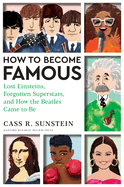
Legal scholar Cass R. Sunstein has a sideline as an armchair psychologist, as he has demonstrated in books like Look Again: The Power of Noticing What Was Always There. With the elucidating and constantly surprising How to Become Famous: Lost Einsteins, Forgotten Superstars, and How the Beatles Came to Be, Sunstein hangs out yet another shingle: Beatlemaniac.
How did the Beatles (among others) do it? Sunstein reminds readers that qualities like ambition, stick-to-itiveness, resilience, and ability aren't pathways to becoming luminaries in one's field; how can they be when countless people with these qualities don't get famous? Sunstein says that in addition to dumb luck, social influences make the difference; in manageable bites, he defines informational cascades, group polarization, and other social phenomena. While Sunstein concedes that there are ways to improve one's odds of becoming famous, one probably shouldn't bet the farm on, say, landing a booster like Beatles manager Brian Epstein.
How to Become Famous is loaded with famous-person examples and personal stories that reinforce Sunstein's arguments. His enthusiasm for Muhammad Ali drives a tale about how a boyhood incident flukishly sealed the future boxing champ's fate: when the young Ali reported his bicycle's theft to a police officer, the cop encouraged the fighting-mad kid to learn how to box. Sunstein's point is that had Ali's bike not been stolen, he never would have discovered boxing. In fact, Ali could have ended up like another of Sunstein's subjects: Connie Converse. Who's Connie Converse? Exactly. --Nell Beram, author and freelance writer

